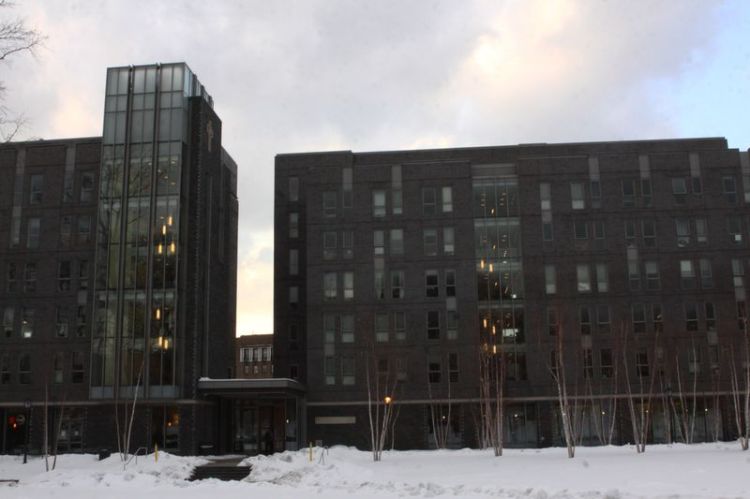By KELLY KULTYS

Campbell and Salice-Conley Halls were the most recent additions to be funded by the Excelsior Ever Upward campaign.
(Samuel Joseph/The Ram)
A map of Fordham University in 2009 compared to today would be quite a different picture. There would be fewer residence halls, a single fitness center, an older law school and outdated dining facilities.
Those are just a few of the motivations for Excelsior Ever Upward: The Campaign for Fordham. According to the website, the campaign “seeks…to bring Fordham into a new era of preeminence by 2016, its 175th anniversary.”
The campaign began publicly in 2009, and its lofty goal of $500 million was announced at the annual Founders Gala.
According to Roger Milici, vice president of development and university relations, Rev. Joseph M. McShane, S.J., president of the university, will officially announce at this year’s Gala, on March 31, that the campaign has exceeded its goal. Milici reported more than $522 million has been raised at this point. He speculates that by March, the announced fundraising will be around $530 million total.
The campaign was divided into five major areas that were defined as strategic priorities across Fordham’s campuses: facilities, academics, financial aid, academic support and endowed chairs.
Facilities had the most visible improvements, tackling large projects including the refurbishing of Campbell and Salice-Conley residence halls, the renovation of Hughes Hall for the Gabelli School of Business and updates to the McGinley Center, as well as smaller scale projects such as renovations to the football locker rooms and improvements to several science labs.
“We were ambitious [with facilities] right up front,” Milici said. The Excelsior Campaign was looking to raise about $170 million for facilities alone, but the actual number currently sits around $114 million.
This number also includes gifts and pledges for other upcoming projects, such as the new law school building and residence hall construction at Lincoln Center, as well as the restructuring of Loyola and Faber Halls here at Rose Hill.
For academic support, the goal was to raise $100 million to help fund centers, institutes and programs for the university, such as the Francis and Ann Curran Center for American Catholic Studies. As of today, the campaign has brought in more than projected, adding $115 million.
While the campaign was able to add 44 endowed chairs, according to Milici, this area did not quite meet its goal, currently sitting about $20 million shy of the $80 million sought. The most recent addition, the Karl Rahner, S.J., Memorial Chair in Theology, was just installed on Feb. 11.
One area that exceeded expectations, however, was financial aid. Milici said that donors were very generous to this particular area, contributing $105 million, far surpassing the goal of $70 million.
According to Milici, financial aid is a “high strategic priority” for the university because he said “[Fordham] doesn’t want to become a place just for the affluent.” Milici says the university wants to accept students from a variety of backgrounds who normally would not be able to attend without Fordham without aid.
Annual support, which Milici says is the last major area of the campaign, with contributions of $130 million, far surpassed the goal of $80 million. Milici said these gifts cover areas such as athletics and university programming, as well as Career Services.
“Dedicated donors want to make that part [Career Services] as good as it can be, so they specifically directed money towards that,” Milici said.
Beginning this campaign in 2009 could not have come at a worse time, with the recession of 2008 fresh in everyone’s minds, but Fordham was still able to reach and surpass its goal. Milici says that this is thanks to the generous donors, including trustees, alumni, family and friends of Fordham.
“We achieved success in this campaign without a ‘mega gift,’ of $75 or 100 million,” Milici said. “Our biggest gift was by Mario Gabelli and the Gabelli Foundation.”
However, a large part of the funding came from the Board of Trustees—both current and previous members. Milici said they donated over $150 million, which is about one-third of the goal. He called this “true leadership by example.”
“This shows they are supportive of the strategic plan of the university,” Melici said.
Milici said that through working with the campaign, his proudest achievement comes whenever he can “marry a strategic need” to a donor who wants to create a positive impact at the university.
Milici said that he is happiest when he is able to “demonstrate back to the donor a tangible difference” made by their contribution. He said there is “nothing better” than that feeling that comes from putting donors’ money to good use.
Kelly Kultys is Editor-in-Chief at The Fordham Ram.
